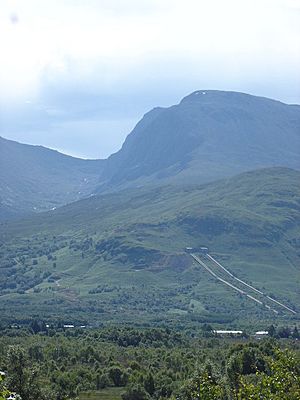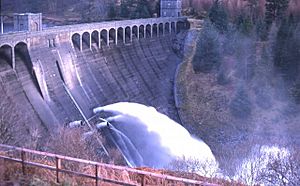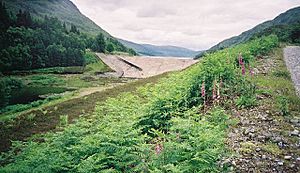Lochaber hydroelectric scheme facts for kids
The Lochaber hydroelectric scheme is a huge project in the Scottish Highlands. It uses water power to make electricity. This electricity was first used to help make aluminium at a factory in Fort William. The scheme was built after the First World War and is still working today.
Building the Lochaber Power Scheme
The idea for this big project came from an engineer named Charles Meik. After he passed away in 1923, another engineer, William Halcrow, took over. He was a partner in the company Meik had started.
The plan for the scheme was approved by the government in 1921. However, building work did not begin until 1924. By December 30, 1929, the first aluminium was made. The factory used about 95% of the 82,000 kW of power the scheme created. This factory later became part of a company called British Aluminium.
The scheme collects water from the top parts of the River Treig and River Spean. It also uses floodwaters from the River Spey. Plus, it gathers water from eleven smaller streams, called burns, along the way.
The Laggan Dam is a key part of the project. It is 213 m long and 55 m high. This dam holds back the River Spean, creating a large reservoir.
From the Laggan Dam, a 4 km long tunnel connects this reservoir to another one. This second reservoir is Loch Treig, which is held by the Treig dam.
The main tunnel starts from Loch Treig. Until 1970, it was the longest water tunnel in the world. It is 24 km (15 miles) long and 5 m wide. This huge tunnel goes around the side of Ben Nevis, Scotland's highest mountain.
Finally, the water rushes down five massive steel pipes, called penstocks. These pipes carry the water from the mountain down to the turbines. The turbines are in the power house, which is part of the smelting plant. This is where the electricity is made.
How it Works Today
Over the years, many other aluminium factories in the UK closed down. These included ones in Invergordon (1981), Kinlochleven (2000), Anglesey (2009), and Lynemouth (2012). The Lochaber scheme and the factory at Fort William were then run by a company called Rio Tinto Alcan.
In 2016, the factory was going to close. But a company called GFG Alliance, which includes SIMEC and the Liberty House Group, bought it for £330 million. They plan to make the factory bigger. They also want to start making car parts there.
In 2021, it became known that a large area of land, called Jahama Highland Estates, was bought in 2016. This land was part of the deal for the Lochaber aluminium plant. The factory needs a lot of power. So, it is built near a hydroelectric plant that uses water from this 114,000-acre estate. The estate includes the north side of Ben Nevis.
The Scottish Government had wanted the land to stay connected to the power plant and factory. This was because the land is important for the water supply. The 2016 deal was supported by the UK government.
See also
- Lochaber Narrow Gauge Railway for how the water-carrying tunnel was built and maintained.
- Problem of water in vertical shafts, see item 5 at http://www.spanglefish.com/ooooppss/index.asp?pageid=608087
 | Shirley Ann Jackson |
 | Garett Morgan |
 | J. Ernest Wilkins Jr. |
 | Elijah McCoy |




